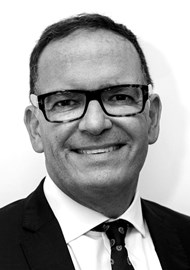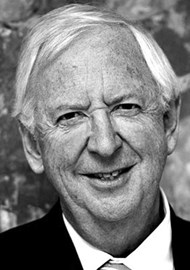Our illustrious friend, Harvey Coates, hears about Professor Friedland’s amazing personal journey, ranging from horrifying exposure to violence through to his clinical care for (and friendship with) Nelson Mandela and his prevailing passion for teaching.
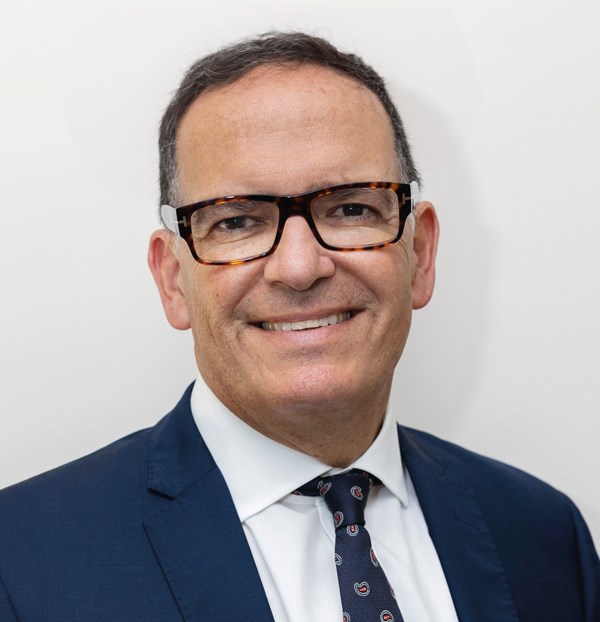
Professor Peter Friedland.
Professor Peter Friedland is an otolaryngology head neck surgeon and was recently appointed the Garnett Passe and Rodney Williams Memorial Foundation Professor of Otolaryngology-Head and Neck Surgery at the University of Western Australia. Originally from South Africa, Peter Friedland graduated in medicine at Wits University. He completed ENT training in South Africa and a master’s degree in otolaryngology researching HIV.
While in South Africa, with Professor Robert Briggs, Peter conducted the first hands-on cochlear implant workshop for African trainees, registrars and consultants. He was also the personal ENT surgeon to Mr Nelson Mandela from 2000 to 2009. Due to increasing violence and concerns for his family’s safety, Peter moved to Australia in 2009 and took up a full-time consultant post at Sir Charles Gairdner Hospital in Perth. During his almost 15 years in Western Australia, he has been head of department at Sir Charles Gairdner Hospital and chair of the West Australian ENT Training Committee.
He has been involved in outreach projects in the Pilbara and Kimberley and several research projects in otology, rhinology, and head and neck cancer. Professor Friedland is also a squadron leader in the Royal Australian Air Force Reserves and has a charity providing ENT and health services in Bhutan. It is indeed a great pleasure to interview Peter and to share with readers the fascinating journey of this remarkable man.
Thanks so much for joining me, Peter. Let’s start by hearing about your early years in South Africa, and your journey to become an ear, nose and throat surgeon.
Thank you very much, Harvey. I appreciate this interview opportunity and your time. I grew up in South Africa through the awful apartheid years. My late father had become very ill with a crippling neurological condition while I was a young child. I was disillusioned with medicine, as we experienced a real lack of empathy and compassion for my dad. As a result, I chose veterinary science. But, after four years, I realised that an animal’s life was not absolute: it was relative to that animal’s economic or emotional value. How my father was treated in the 60s and early 70s in South Africa stayed with me, and it motivated me to begin to practise medicine with a constant awareness of deep compassion and empathy.
You trained in ENT at Wits University and then worked in a large tertiary hospital in Johannesburg. Tell us about your experiences there.
My training occurred during the transition from apartheid to the birth of a new South Africa. Our medical training at Wits University, Baragwanath Hospital in Soweto and the Johannesburg hospitals was of an extremely high standard. We had superb teaching and many highly dedicated clinician specialists who worked full-time in the public sector and were genuinely committed to public healthcare. These devoted and enthusiastic clinicians inspired me greatly and set a remarkable example for my future career.
Tell us about the HIV issues in the hospital at the time.
HIV was (and to a large extent still is) a massive issue in Southern Africa. By the time I worked as an ENT, more than five million people in South Africa were living with HIV infection and full-blown AIDS. Over two million HIV orphans have lost both parents to this tragic disease. In the early days, we only had AZT, which wasn’t very effective. President Thabo Mbeki (who had followed President Nelson Mandela) and his Health Minister held seriously damaging dissident views on HIV, believing that HIV was a disease of poverty and malnutrition. Absurd beliefs included ‘HIV is nothing to do with a virus, it’s a white man’s conspiracy to wipe out Africans’. They refused to legalise antiretroviral treatment, resulting in a massive epidemic explosion and maternal transmission. We knew from the data that just a single dose of AZT would prevent mother-to-child transmission. It was challenging, and over 70% of our public sector patients were HIV positive. At this time, doctors working in South Africa (particularly in very busy trauma units) experienced a high incidence of needle stick injuries. Several doctors and medical students tested positive following needlestick injuries, and a few even developed full-blown AIDS, which was tragic.
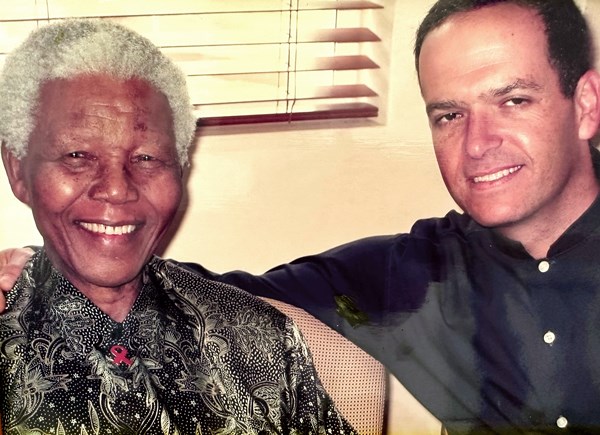
Peter with Nelson Mandela.
What was your first experience meeting Mr Nelson Mandela?
I met Nelson Mandela indirectly in 1990. A decade later, I was asked to attend to him at his Houghton home. He had just flown back from Maputo and was terribly frustrated that he could not hear. Professor Michael Plitt, who was the doyen of physicians at the time, and a highly respected worldwide pulmonologist who had looked after Madiba for more than 20 years, rang me on a Sunday afternoon and asked would I mind going to see Mr Mandela at his home? I said to Mike, “would I mind? I’ve been waiting for this moment all my life”. When I saw Mr Mandela, I had to contain my tears because here was one of the greatest human beings that I ever had the privilege of being in the presence of. He emanated a radiance, a warmth, a smile that was tangible. You could not explain it to anybody, but everyone who met him had exactly the same experience and it was one of the most significant and pivotal moments of my life.
You were Nelson Mandela’s ENT surgeon for about nine years. Without telling us all the details of your interactions with him, which will be in your forthcoming book, what were some outstanding moments?
Each visit with Madiba created opportunities for deep insights and learning; some of the profoundly moving moments I experienced with Madiba were the stories he shared. He would frequently relate a parable or engaging narrative to educate me about his opinion on world affairs. He read every available newspaper daily from cover to cover. He began always with the Afrikaans newspapers, the language of the oppressor. He had taught himself the language while incarcerated on Robben Island to negotiate with the Afrikaans jail wardens. We would take a deep dive into the headlines of the day. These times with Madiba were the highlight of my career.
You address Mr Mandela as Madiba. Can you explain what that means?
It is a sign of reverence to address an elder (much like our Aboriginal elders) by their clan’s name. Madiba represented his clan’s name. He was also often called Tata (father or grandfather), especially by his close friends and family and as Tata Madiba. Mr Nelson Mandela is a very westernised form of greeting. Tata Madiba was both deeply respectful and very warm.
What precipitated your move to Western Australia in 2009?
It was not an easy move. There is an ancient saying, “Man plans and God laughs”. I did my utmost to fight for democracy. My sister had emigrated to Australia some 30 years prior, and I casually stated that I would be unlikely to ever go there. Then came an opportunity, and I ended up in Australia! My professional life in South Africa transformed into becoming a head and neck ENT trauma surgeon. Violence was at an all-time high. There was tremendous upheaval in the late 1980s. Political parties had been banned. There were uprisings. The political climate was complex.
"You could not explain it to anybody, but everyone who met him had exactly the same experience and it was one of the most significant and pivotal moments of my life"
I treated two to three head and neck gunshot victims weekly. On my 34th birthday in 1995, my close friend and ENT partner, Dr Steven Pon, was shot and killed outside the hospital for his car. A second close friend was shot dead at his factory; I was first on the scene. Then again, in January 2008, a friend of mine was fatally shot through his neck while we were waiting for our children to come off the soccer field in broad daylight. Whilst his sons ran to the car, our unsuccessful attempts to resuscitate him haunt me to this day. Something finally died in me that night, and I needed to make a choice to move my children to a safer place. I applied to several posts and countries, including the UK, Ireland, and Australia. After several rejections, I was offered a position in Perth in November 2008 to commence work within eight weeks. I took it immediately.
How did Mr Nelson Mandela react to your move to Australia?
It was a challenging meeting. It was one of the hardest things about leaving South Africa. I share this in great detail in my book, which will be launched next year. I am about to explain to this man who had spent 27 years in prison and endured unimaginable hardship, suffering and oppression his entire life, that this white fellow had had enough, so I went with enormous trepidation. Madiba was not happy, but he was not judgmental. He gave me a profound lesson and conditional permission related to Australia and the First Nations people. That meeting and farewell continue to inspire my life daily in Australia.
Apart from your clinical and research interests, your main passion has always been teaching at undergraduate and postgraduate levels, with 11 teaching awards to your name. What skills does one need to be an effective teacher?
I think enthusiasm is a crucial element. Students are also very quick to pick up your authenticity and genuine concern and interest in the subject, their education and, most importantly, their needs and personal wellbeing. I had the good fortune to learn from incredible teachers at Wits University.
They truly inspired me, and how they shared their knowledge impacted me. Another aspect of teaching is to regard students as knowledgeable adults with lives outside of medicine. It’s never about showing them how little they know, but rather how much they do know and can learn. It’s about empowering, not humiliating, them. Never underestimate how much they value this approach. Although medicine has a natural hierarchy, treat them respectfully as your future colleagues. These students will be your colleagues soon and will be teaching or surpassing you. Although you give so much in teaching, you truly also receive so much.
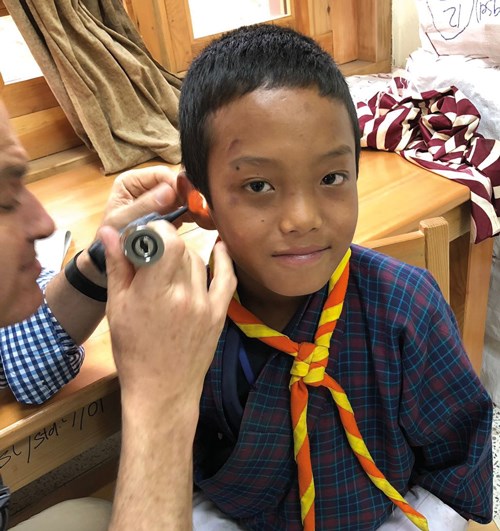
Prof Friedland has a charity that provides
ENT and health services in Bhutan.
In South Africa, you were involved with a school for 300 deaf children. You have continued this work in Western Australia and your charity in Bhutan. What drives you to do this social impact work?
I am reminded of Isaiah’s quote, “The rock from which you were hewn”. My twin brother, sisters, and I were brought up on charity. My father, seriously ill with a debilitating neurological condition, could not work. My mother was a humble schoolteacher who held three extra jobs to keep food on the table. My brother and I were doing after-school and weekend work from the age of 11 behind the till at the local supermarket. My mother taught us a precious lesson that, even though we were the recipients of charity, we should still always give to those less fortunate. I would come home and find a jumper missing and ask my mother where it was. She would say, “I’ve given it to someone who needs it more”. It has shaped my life. The notion is that there are always more disadvantaged and less fortunate people. It became the background to my life’s work, and I have also instilled it in my children.
Besides your research and laryngology, you are involved in a nasal spray to treat the common cold. Tell me about its possible application for COVID-19.
I’m the medical officer of Firebrick Pharma, which has researched and developed a nasal spray to treat the common cold. Two brilliant pharmaceutical and biotechnology professionals started the company. They formulated a povidone-iodine nasal spray (Nasodine) that kills microbes, particularly all nasal viruses. The PVP-I in this formulation is at an exceptionally low concentration (0.05%). It has demonstrated zero toxicity and complete safety and efficacy. This research and development began in 2012 and took almost six years. When I came on board in 2017, the human clinical trials had not started. We embarked on phases 1, 2 and 3 clinical trials for treatment of the common cold. Viral nasal infections affect millions yearly with a high morbidity and economic impact. At the start of the COVID pandemic, we were able to evaluate the spray against the virus: we demonstrated in vitro within 60 seconds, there was a 99.7% killing of the SARS-COV2 virus.
This was in the early days of COVID. We ran a pilot trial in South Africa on COVID-positive patients, but it was a small cohort. We have subsequently performed a Phase 2 trial with excellent results. Conducted in South Africa, we recruited 39 subjects, 23 of whom were culture-positive and qualified for the primary endpoint population. The primary endpoint in the Phase 2 trial was the reduction in viral load of SARS-CoV-2, the virus that causes COVID-19, over four days, based on culturable virus from throat and nasal swabs. Nasodine treatment resulted in 100% reduction by day four, compared with 48% for placebo – this difference was statistically significant (p=0.028).
We have completed a double blinded controlled randomised trial on the treatment of the common cold. Unfortunately this trial did not meet its primary endpoint which was the impact of Nasodine on overall cold severity in subjects with a confirmed viral infection. As scientists, we accept the disappointing results but this will not deter our efforts in improving our research methods.
Your five-year plan with the Garnett Passe and Rodney Williams Memorial Foundation is to improve outreach and services in this vast site of over 2.5 million square kilometres. How do you hope to accomplish this?
There is an ancient saying: “It is not up to you to complete the mammoth task, but neither are you absolved from doing your best to participate”. I need to engage in this process. I can only do this by standing on the shoulders of the giants who have pioneered this work and continue to do so; and, by that, I mean you, Professor Coates. Harvey, what you have done for Aboriginal health throughout Australia by introducing universal newborn hearing screening and, mainly, what you have done for indigenous ear health disease in Western Australia is hugely inspiring to me. By following in your footsteps and those of Alastair MacKendrick and others here in Western Australia, I’m motivated to keep improving and growing these services. I believe the path forward is guiding the next generation of doctors, building capacity and sustainability in our programmes and people. I want to create a six-month trainee rotation through remote and rural communities. ENT trainees could possibly spend six months in the East and West Kimberley or the Pilbara or Southwest.
I believe that once our younger colleagues are immersed within communities and gain the trust of those communities, they may be encouraged to spend more time or even move to these places, increasing our capacity in much-needed communities. The second approach is that we truly need to increase the number of training posts in Western Australia. We are a massive state, yet we have only seven trainees at any one time. The last post we established in Perth’s North was the first new post in 20 years in Western Australia. We need more trained specialists for our population.
Well, thank you, Peter. Do you have any final words for our readers?
It’s been a privilege to have this opportunity to speak with you, Harvey. You are a wonderful mentor, an absolute inspiration, a true gentleman and professional, and an Australian and world leader in ENT. I’ve been extremely fortunate. I’m genuinely grateful to South Africa for everything I have gained and learned. Australia has given me a fair go, and I deeply appreciate the second career opportunity here.


